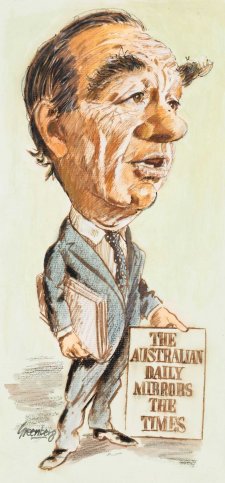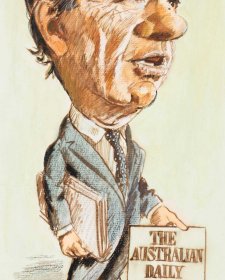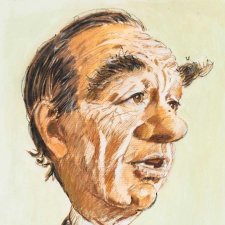- About us
- Support the Gallery
- Venue hire
- Publications
- Research library
- Organisation chart
- Employment
- Contact us
- Make a booking
- Onsite programs
- Online programs
- School visit information
- Learning resources
- Little Darlings
- Professional learning
Richard Pratt (1934-2009), businessman, came to Australia with his parents, Polish Jews, in 1938. He studied commerce at the University of Melbourne, becoming a promising AFL player but turning to acting, in which he enjoyed some success. However, his career lay with his family business, Visy Board. Under his direction, the packing materials business expanded from two Melbourne factories to fifty-five, in Australia, the USA, New Zealand and New Guinea. Visy ventured into paper recycling in the 1990s; Pratt was named Environmental Visionary of the Year and made a Companion of the Order of Australia in 1998. (His wife, Jeanne, was made an AC in 2002.) He made substantial donations to political parties and retained former prime ministers and state premiers as consultants and advisers. He also donated substantial sums through the Pratt Foundation to refugees and artists. However, following earlier investigations, in December 2005 the ACCC commenced a civil penalty proceeding against Visy companies, Pratt, and others, for alleged involvement in a cartel in the packaging industry. In October 2007, six months after he became Chairman of the Carlton Football Club, Pratt was formally accused of price fixing, cheating customers and companies out of approximately A$700 million in the nation's biggest-ever cartel case. For a year, Pratt denied ACCC allegations of 'very serious contraventions' of the law that he had 'deliberately concealed', but admitted guilt and was fined $36 million, some three-quarters of his fortune, in 2007. He returned his Australian honours the following year. Criminal charges against Pratt were dropped the day before he died.
Collection: National Portrait Gallery
Gift of the artist 2001
© Estate of Joe Greenberg
Joe Greenberg (37 portraits)



On one level The Companion talks about the most famous and frontline Australians, but on another it tells us about ourselves.



A collection of thirty-seven caricatures by the artist Joe Greenberg capture the heroes and villians of Australian business in the 1980s.



Visit us, learn with us, support us or work with us! Here’s a range of information about planning your visit, our history and more!